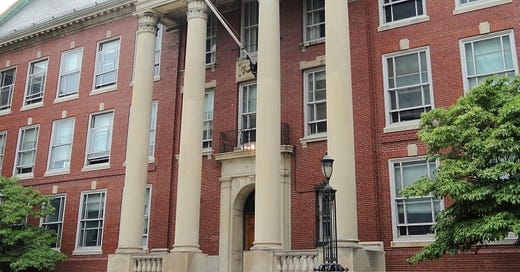09.23.2023
This edition of Contrarian Boston is sponsored by Zakim Strategies, innovative public policy advocates and advisors with a record of success across the Commonwealth.
Shark Week every week at the Herald | State watchdog has dopey cannabis regulators in her sights | Mass. judge’s bizarre take on “cruel and unusual punishment” | Scores plunge at Boston exam schools | Kennedy Institute a laugher no more |
News tips? Story ideas? Email us at sbvanvoorhis@hotmail.com
Precipitous slide: Test scores at Boston’s exam schools take big hit in wake of controversial new diversity standards
Here’s more bad news for BPS: The city’s traditionally elite exam schools have seen the MCAS scores of their newest students tank.
The most dramatic drop? Hello Boston Latin Academy, where just 38 percent of seventh graders met or exceeded expectations on the language arts section of the state test in 2023. That’s down from roughly 72 percent in the pre-Covid years, with a similar drop for math.
Similarly, at the John D. O'Bryant School of Mathematics and Science, just 50 percent of seventh graders met or exceeded expectations in math, down from 85 percent as recently as 2019.
Nor was the Boston Latin School, the crown jewel of the system, immune: Just 70 percent of seventh graders at the either met or exceeded expectations in math, down from 94 percent three years ago.
The troubling numbers come in the wake of a controversial new diversity policy that has seen well over 100 straight-A students rejected from one or more of Boston’s exam schools.
Elite no more? In wake of new admissions policy, a third of Boston Latin School seventh graders now have low math MCAS scores
In a bid to diversify the student body in its three exam schools, the new BPS exam schools’ admissions system divides the city up into eight socio-economic tiers and then allocates an equal number of seats to each one.
However, there’s a big problem with giving each tier the same number of seats, and it’s this: There are simply far more applicants than exam school seats in the higher socio-economic tiers, which include neighborhoods like West Roxbury, than in less well-off neighborhoods like Dorchester.
The result? A large number of high-achieving students were rejected, with a score of 97 or higher now needed to earn a seat at any exam school.
Contrarian Boston reached out to a BPS spokesperson, but did not hear back by our deadline.
We suspect, though, that BPS may attempt to blame the big drop in MCAS scores at the city’s top schools on disruption caused by the Covid pandemic.
However, while MCAS scores did fall at schools across Boston, that drop was nowhere near the magnitude seen at the city’s exam schools.
Clearly something else is going on here.
############################################################################
You are reading the free edition of Contrarian Boston. Here are some of the stories a paid subscription would unlock:
Fan Pier II? It’s going to take decades to build out Dorchester Bay City
Only in Massachusetts: Taking away a pension is now cruel and unusual punishment
Troubled Cannabis Control Commission attracts the attention of state watchdog
The Herald finds a new way to hook readers: Lots and lots of shark stories
Blowup in Wellesley: Meeting over future of a property owned by elderly nuns goes off the rails
Big yawn: In other news, Wu announces plans to rewrite Boston’s zoning code
What are they thinking? Wu administration’s revamp of key downtown Boston thoroughfare sparks furor
Hot off the presses: An epic history of Boston hits the bookstore
Spinning the housing numbers: Wu administration downplays dramatic drop in residential construction
Please click below to subscribe. Thank you!




